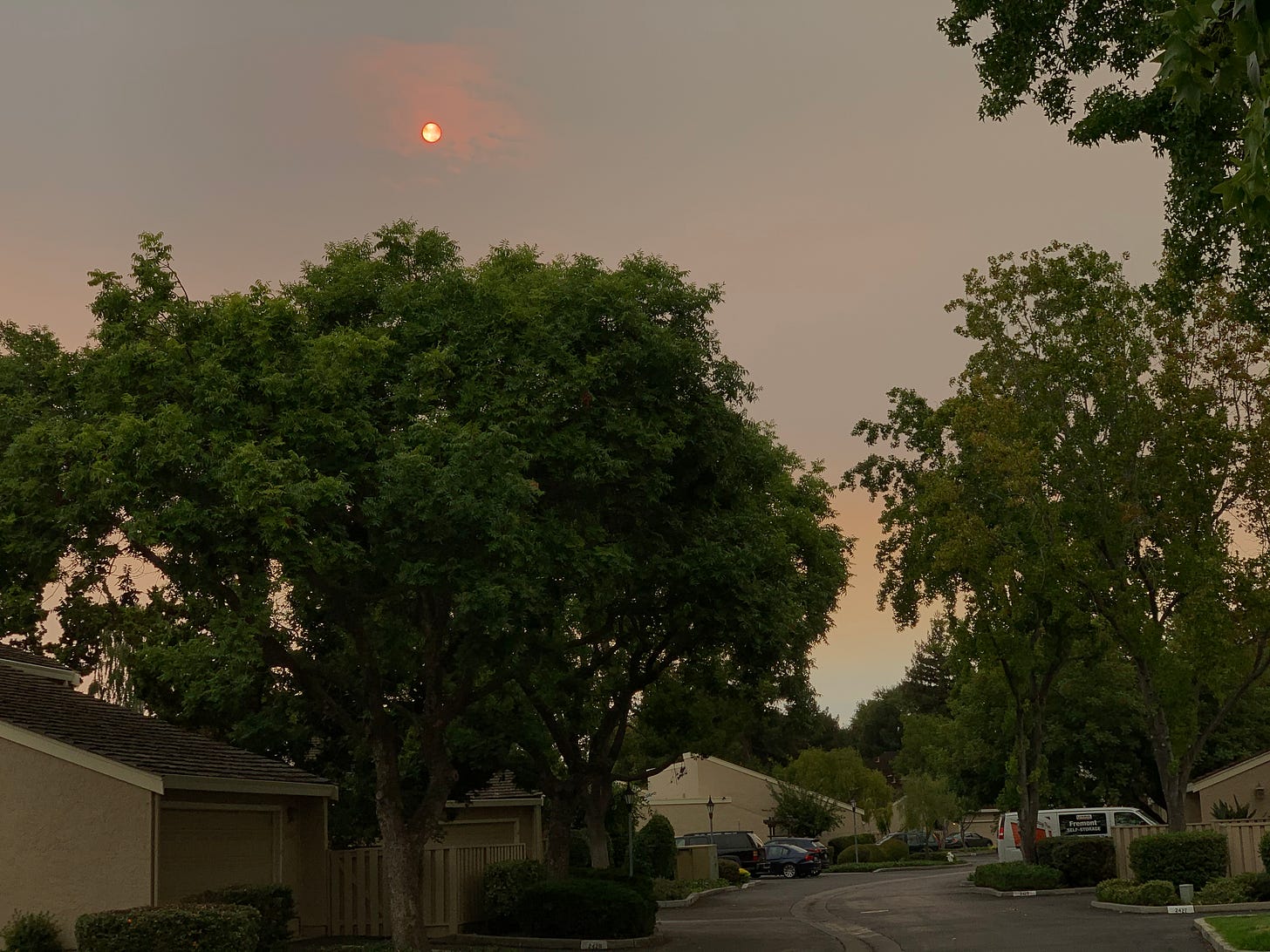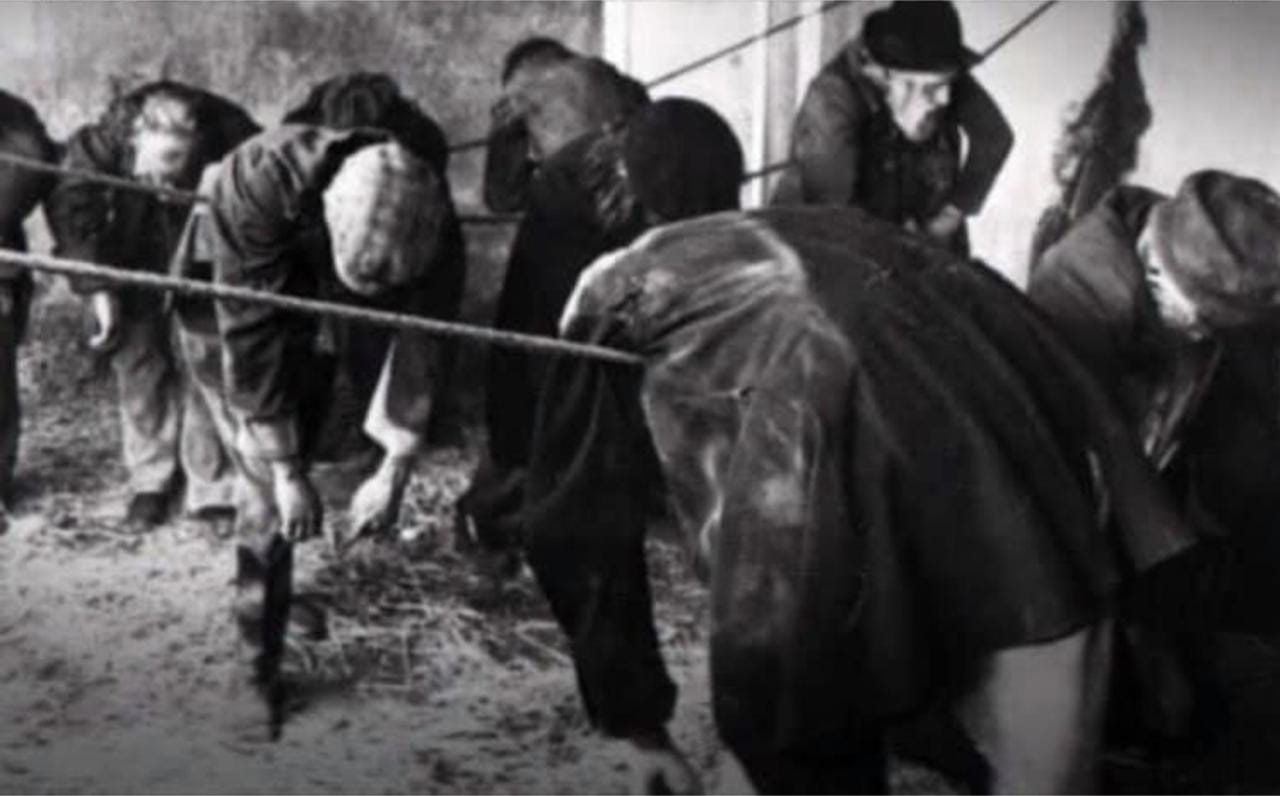How'd it get burned?, having an impact, confidence bounds, and hangovers
another krappy newsletter #4
Hey gang,
I am writing to you from the California Bay Area. We have a lot of smoke right now because things go on fire here. This happens so frequently around this time of year that we even have a name for it: fire season.

Photo cred: KA
_______
HOW’D IT GET BURNED?
The narrative around fires in California frustrates me to my core. I find it bizarre how we have come to believe this is the way it needs to be. The learned helplessness within the California population around the subject of fires is staggering.
You hear it in the language we use:
“It is what it is."
“Well what are we supposed to do?"
“Something something global warming."
You hear it in the way we debrief after each fire:
"How did PG&E not see this coming!"
"Can you believe this camper who didn’t put out this ember?"
But you never hear people talk about actually fixing the problem.
In a state where we generally look down on blaming people for their behavior and challenge ourselves to instead look at the system that lead to the problem, why do we make an exception for fires?
My best guess: it is too expensive to make meaningful progress on this problem.
A solution would look like millions of dollars invested in:
Assisting in retro fitting old power lines
Controlled burns of land to avoid areas highlighted as high risk for a large continuous burn.
Fire fighting equipment such as a dope ass planes that extinguish flames such as:
Flame retardant fire fighting plane
Planes that literally throw a body of water on a fire
No politician would run on a platform of spending millions to prevent fires because American culture generally champions fire fighting not fire preventing.
We should change that.
The truth is that climate change has permanently increased the probability of fires occurring. But we shouldn’t be wallowing in our self pity, we should be asking "how do we reduce the probability of fire or increase our ability to fight them?”
Sorry. I am a little cranky because I cannot go outside.
On to the things I learned and/or interacted with this week:
_______
HAVING AN IMPACT ON THE WORLD
Here are two sources I read this week that talked specifically about how to have an impact on the world.
Ayush Sharma: So you want to have an impact?

The three levers to move the earth –
1) Startups
2) Information & Media
3) Politics
Startups
If you want to reach billions of lives and meaningfully impact them, startups are your best bet. The key formula is to make something that people want and then relentlessly scale it.
Information & Media
Information is a lever that allows you to directly program people's brains. The info people consume shapes their minds.
If you can read, write, and speak well, you get to have the superpower of mind control.
I have only recently started to understand/respect the power of media and how people use it to shape reality for everyone else.
Let me know if you have any other resources on media and how its changing the world!
_______
Sam Altman: Vector theory of impact

The expected value of your impact on the world is like a vector.
It is defined by two things: direction and magnitude. That’s it.
Direction is what you choose to work on. Almost no one spends enough time thinking about this. A useful framework for this is to think on a long-but-not-too-long timescale (10-20 years seems to work), to think about where the world is going to go if current exponentials continue on (which is harder to do than it sounds like it should be), to think about what you’re genuinely interested in, and to think about what you can do better than anyone else (someone will ~always be better than you at any one thing—the easiest way to do something no one else can is to be 95th percentile at several skills, and to do something at their intersection). You also have to learn to trust yourself when people don’t see what you see.
Magnitude is how hard you push in your chosen direction. Most people don’t push nearly hard enough—they give up too quickly, or care too much about what other people think, or don’t work hard enough, or something like that. Pushing hard is often uncomfortable, but it is how things get moved. Developing an early and strong sense of self-belief (but not so strong you don’t adapt to feedback and new data) is critical to this. Getting people to join you in your quest, and inspiring them to outperform, is usually critical—most really important things can only be done by teams. The easiest way to push hard over a long period of time seems to be to really care a lot about the work itself and the outcome you’re striving towards.
I find it liberating that you only have get two big things right!
As I think about the state of careers right now, there appears to be a lot of people who get 1 out of 2 right, but miss 2 out of 2.
Magnitude without the direction: Investment banking is known for how they make people burn the midnight oil. But few people seem to have a passion for investment banking.
Direction without the magnitude: Non-profits where people are fighting for world hunger or some other great cause, but working a 9-5 Monday through Friday job with known existing tools and technology. If world hunger could be solved with an ordinary effort and tools, we probably would have solved it by now.
_______
CONFIDENCE INTERVALS
This is the best definition I have read so far on confidence intervals for you stats nerds out there.
From Cassie Kozyrkov (Chief Decision Scientist at Google):
Note: ⍺ = significance level
The % confidence level is not a probability of the interval containing the estimated parameter, but rather a quality statement about the overall procedure. To grok what that 95% probability is referring to in a 95% confidence interval, we'd have to talk about parallel universes. Maybe run back to safety now?
But, if you insist:
"Were this procedure to be repeated on random samples collected in infinite parallel universes, the calculated (1 - ⍺)% confidence interval -which would differ for each sample- would encompass the true population parameter in (1 - ⍺)% of the samples."
In other words, in ⍺% of parallel universes, your interval is total garbage. And if you live in one of those then the interval you just calculated HAS NO MEANING.
It is important to remember that just because someone did a fancy statistical analysis doesn’t mean it is actually going to be correct.
_______
FUN PHOTO WITH AN EVEN MORE MORE FUN FACT

Ever wonder what the origin of the word hangover is? You are looking at it. In the old days, when people would get too drunk they had the option to pay someone $1 to go sleep it off. The business owner set up some ropes and they literally hung there and slept it off. History is epic.
Catch you all next time. Let me know if anything resonated with you and feel free to forward this on to friends.




